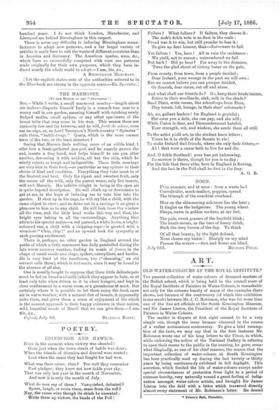THE MARMOSET.
To THE EDITOR OF THE " SPECTATOR." ]
Sirt,—While I write, a small marmoset monkey—length about six inches—disports himself freely in a sumach-tree near to a sunny wall in our garden, amusing himself with catching newly fledged moths, small spiders, or any other specimens of the insect tribe that may come in his way. This season these are curiously few and far between, and he will, fate de mieux, even eat earwigs, or, as Lord Tennyson's North-country" Spinster" calls them, "battle-twigs." Query, which is the more correct term of the two, or the least incorrect ?
Seeing that Marmie finds nothing more of an edible kind, I offer him a fresh-gathered pea-pod, and he eagerly gnaws the end, inserts a tiny hand, and helps himself to one pea after another, devouring it with avidity, all but the skin, which he wisely rejects as tough and indigestible. These little monkeys are very nice in their food,—as particular as any epicure in their choice of kind and condition. Everything they take mast be of the freshest and best. Only the ripest and sweetest fruit, only the cream off the milk, only the purest water, only live insects, will snit Marmie. His infinite delight in being in the open air is quite beyond description. He will climb up or downstairs to get at me, in the hope of inducing me to take him into the garden. If shut up in his cage, he will cry like a, child, with the same object in view ; and to drive out in a carriage is as great a pleasure to him as to any child. He will look from the window all the time, and the little head works this way and that, the bright eyes taking in all the surroundings. Anything that attracts his special notice—a red parasol, a white horse, a bright- coloured van, a child with a skipping-rope—is greeted with a vivacious "Chip, chip !" and an upward look for sympathy at each passing excitement.
There is, perhaps, no other garden in England around the paths of which a little marmoset has daily gambolled during the late warm summer weather, finding its meals at fresco, in the shape of small snails and slugs, spiders, caterpillars, and beetles. He is very fond of the woodlouse, too (" cheeselog," an old servant calls them), which is fortunate, since it may be found in the absence of all else.
One is usually taught to suppose that these little delicate pets must be fed on bread-and-milk (which they appear to hate, or at least only take when driven to it by sheer hunger), and kept in close confinement in a warm room, or a greenhouse at most. But certainly where it is possible to let them enjoy the fresh open air in warm weather, with a natural diet of insects, it apparently snits them, and gives them a sense of enjoyment of life which is the nearest approach to their happy existence in their native, wild, beautiful woods of Brazil that we can give them.—I am, Sir, &c,


































 Previous page
Previous page